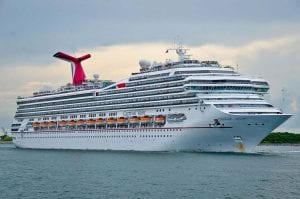CLIA’s Cruise Line Bill of Rights outlines passenger rights.

Carnival Valor Cruise Ship
According to a new guide issued by Christopher Elliott about the cruise line industry, this is the definitive definition of a cruise line bill of rights.
These are the ten rights cruise line passengers have after paying for a cruise experience. When disaster on the high seas or at port arrives, make sure to refer to these “rights.”
His Ultimate Guide to Taking a Cruise Now provides the most up-to-date guidelines available to passengers. Many of these “rights” are not considered enough by many passengers. However, these rights are as far as the cruise line industry goes in cases of passenger care.
These rights and the write-up take liberally from Elliott’s document.
The following section details the refund policies that the Department of Transportation’s (DOT’s) Federal Maritime Commission ruled on earlier this year. All flew under the radar and received little consumer input. These rules were pronounced by DOT’s Federal Maritime Commission in early 2022. This is what America’s cruise line lovers must deal with when seeking redress.
The “Bill of Rights” is a voluntary document developed by the Cruise Lines International Association (CLIA).
After a series of high-profile customer service incidents in 2012 and 2013, the cruise industry adopted a voluntary “bill of rights” for passengers to communicate their rights regarding comfort and care in many vital areas. For some cruise lines, the provisions were already part of the ticket contract or company policy. But it was the industry’s way of saying it could do better.
Here’s the cruise line bill of rights in its entirety:
The Cruise Lines International Association (CLIA) members are dedicated to the comfort and care of all passengers on oceangoing cruises worldwide. To fulfill this commitment, our Members have agreed to adopt the following set of passenger rights:
The right to disembark a docked ship if essential provisions such as food, water, restroom facilities, and access to medical care cannot adequately be provided onboard, subject only to the Master’s concern for passenger safety and security and customs and immigration requirements of the port.
- The right to a full refund for a trip that is canceled due to mechanical failures or a partial refund for voyages that are terminated early due to those failures.
- The right to have available, on board ships operating beyond rivers or coastal waters, full-time, professional emergency medical attention, as needed until shoreside medical care becomes available.
- The right to timely information updates as to any adjustments in the ship’s itinerary in the event of a mechanical failure or emergency, as well as timely updates of the status of efforts to address mechanical failures.
- The right to a ship crew that is properly trained in emergency and evacuation procedures.
- The right to an emergency power source in the case of a main generator failure.
- The right to transportation to the ship’s scheduled port of disembarkation, or the passenger’s home city, in the event a cruise is terminated early due to mechanical failures.
- The right to lodging if disembarkation and an overnight stay in an unscheduled port are required when a cruise is terminated early due to mechanical failures.
- The right to have included on each cruise line’s website a toll-free phone line that can be used for questions or information concerning any aspect of shipboard operations.
- The right to have this Cruise Line Passenger Bill of Rights published on each line’s website.
If you’re at sea and encounter a problem, you may want to invoke your “bill of rights.”
If a cruise cancels, am I entitled to a refund?
The pandemic exposed one of the most absurd aspects of cruising. You could pay tens of thousands of dollars to a cruise line. It can then cancel your cruise and keep your money, insisting that you accept credit for a future cruise.
In early 2022, the Federal Maritime Commission fixed that loophole. It established new requirements for when cruise passengers should receive refunds for canceled or delayed voyages.
The changes define a cancelation as a delay of three or more calendar days. If the cruise line cancels your sailing, you are entitled to a refund. Not only of the fare but any extras, such as shore excursions. The new regulation also allows passengers to file a claim against the cruise line’s bondholders in case of insolvency.
Click here to download the full copy of Christopher Elliott’s Ultimate Guide to Taking a Cruise Now.
READ ALSO:
Lodging properties hurt themselves with a discount hotel site that allows dishonest advertising
Why baggage and mobility device handling reporting rules are important to passengers

Charlie Leocha is the President of Travelers United. He has been working in Washington, DC, for the past 14 years with Congress, the Department of Transportation, and industry stakeholders on travel issues. He was the first consumer representative to the Advisory Committee for Aviation Consumer Protections appointed by the Secretary of Transportation from 2012 through 2018.

 The right to disembark a docked ship if essential provisions such as food, water, restroom facilities, and access to medical care cannot adequately be provided onboard, subject only to the Master’s concern for passenger safety and security and customs and immigration requirements of the port.
The right to disembark a docked ship if essential provisions such as food, water, restroom facilities, and access to medical care cannot adequately be provided onboard, subject only to the Master’s concern for passenger safety and security and customs and immigration requirements of the port.


